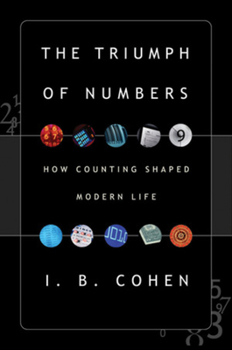The Triumph Of Numbers: How Counting Shaped Modern Life
Select Format
Select Condition 
Book Overview
The great historian of science I. B. Cohen explores how numbers have come to assume a leading role in science, in the operations and structure of government, in marketing, and in many other aspects of daily life. Consulting and collecting numbers has been a feature of human affairs since antiquity--taxes, head counts for military service--but not until the Scientific Revolution in the twelfth century did social numbers such as births, deaths, and marriages begin to be analyzed. Cohen shines a new light on familiar figures such as Thomas Jefferson, Benjamin Franklin, and Charles Dickens; and he reveals Florence Nightingale to be a passionate statistician. Cohen has left us with an engaging and accessible history of numbers, an appreciation of the essential nature of statistics.
Format:Hardcover
Language:English
ISBN:0393057690
ISBN13:9780393057690
Release Date:January 2005
Publisher:W W Norton & Co Inc
Length:209 Pages
Weight:1.08 lbs.
Dimensions:8.5" x 0.8" x 5.8"
Customer Reviews
3 ratings
Compelling
Published by Thriftbooks.com User , 19 years ago
A compelling review of how counting has created history and changed our lives for the better."
A book about the people who were all about the numbers
Published by Thriftbooks.com User , 20 years ago
This is a book about statistics and economics, without the statistics and economics. Cohen explains not just what a census is, or why someone started them, but how people came to realize that census data could be useful in the first place. That's the unique feature of this book - much like the question of who was the first guy to look at a lobster and wonder, is this thing edible?, we find out who was the first guy to look at a register of town deaths and think, "you know, we could tell something about the population of this city from this data!" The book is not about statistics; it's the stories of the people who first came to realize that numbers could be used to improve society rather than just to collect taxes from the populace. I really enjoyed the anecdotes about the various numerical interests of famous people. For example, Thomas Jefferson's obsessive recording of numbers. Did you know that Jefferson calculated that to keep the populace and the politics of a country in good shape, there should be a minor revolution every 19 years? Even more did I enjoy reading about Benjamin Franklin's fascination with magic squares. When Franklin was serving as clerk in the Pennsylvania Legislature, he frequently got bored to pieces and solved and designed magic squares. I liked this because when I'm at boring meetings, I hide pages torn from logic puzzle magazines in my notepad, and spend time doing them, and it looks as though I'm diligently taking notes; it is nice to learn that I am following in the footsteps of a master. Later chapters come back to the part that population counts and demographics played in the founding of the USA, such as examples that a nineteenth century sociologist found of deliberate misuse of population numbers by the Americans in an effort to deceive the British. As others have noted, the final chapter is about Florence Nightingale. Cohen emphasizes Nightingale's reform of the previously almost-nonexistent record-keeping in hopitals in the Crimea, and how she used this data to show that far more soldiers died of disease than of the wounds that initially brought them to hospitals. The illustration showing Nightingale's diagrams of the causes of death in the British army is neat - the diagrams are essentially pie charts, and when I was teaching quantitative software applications to college undergrads, I would have been quite pleased if they had produced charts this cogent. Nightingale considered this graphic representation of numbers, still a novelty at the time, so important that she had copies of the diagrams framed and sent to government officials, in order to keep the issues before their eyes. If one expects a book about the development of statistics, then this book would be a disappointment; if one wants the stories of the people who first thought to put the early science of statistics to use for the improvement of society as a whole, then this is exactly what you are looking for. Although it's a bit dry for a popular
Interesting History on Use of Numbers
Published by Thriftbooks.com User , 20 years ago
This short book discusses the history of the use of numbers to describe the world. The author starts off with a discussion on how numbers began to be used to describe physical items. Eventually, the discussion focuses mainly on the evolution of the use of numbers in the social sciences - hence, the birth of statistics. The book contains some fascinating information on how social statistics evolved, with an entire chapter devoted to Florence Nightingale. It should be emphasized that the focus is mainly on how numbers came to be used and not necessarily on the actual results obtained; thus, if the reader is expecting to see a discussion of the results, he or she may be disappointed at times. But this is a minor shortcoming. The book is well-written and clear. The author (deceased prior to the book's publication) was a well-seasoned expert on the history of science with a good number of publications to his credit.






